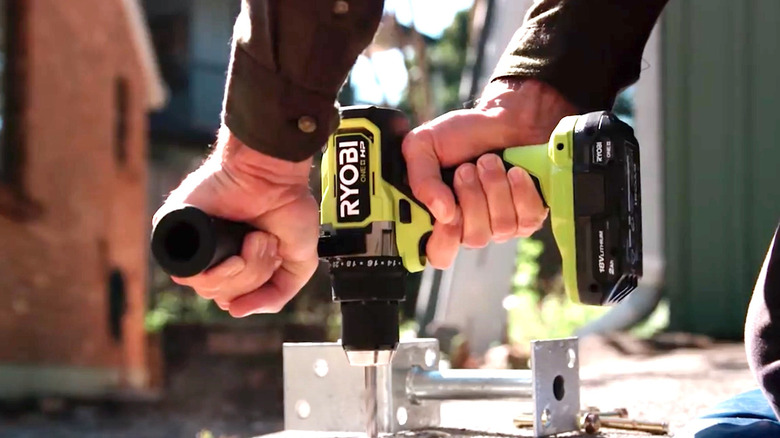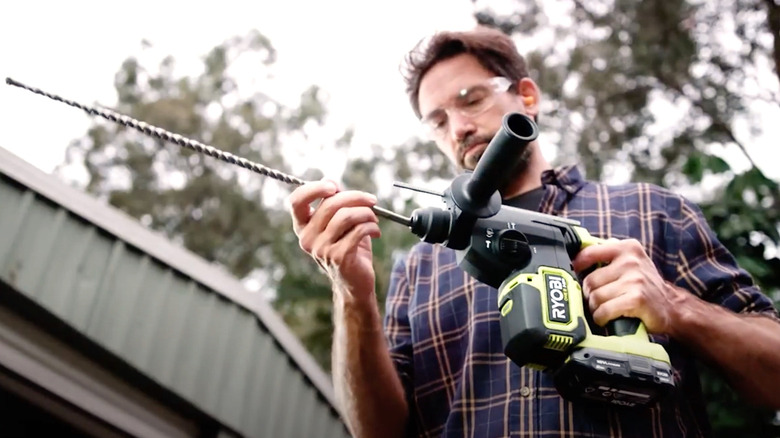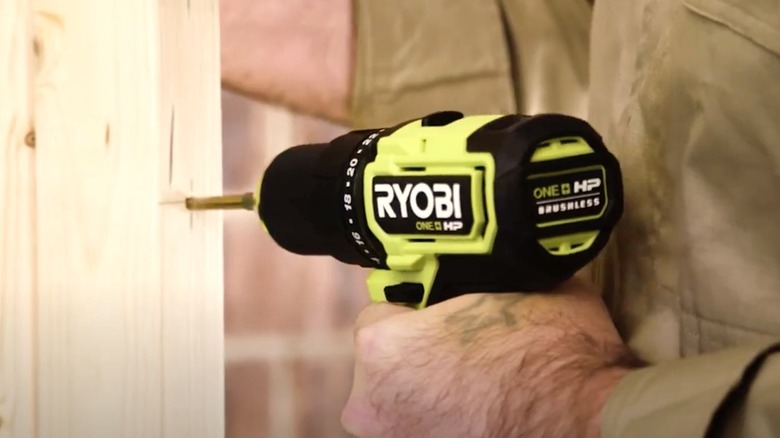Ryobi HP Vs. Non-HP Products: What's The Difference & Are They Interchangeable?
Whether you've got a DIY project you're looking to tackle on the homefront or a more substantial task to handle at a work site, it's likely that Ryobi makes a tool that can help you get the job done. The brand has been making power tools in some capacity since the 1940s, and over the years, it has developed a well-respected and well-reviewed lineup of devices. These days, they're also more readily available to consumers, with Ryobi broadening its distribution channels beyond the shelves of The Home Depot to include the likes of major retailers like Walmart and Amazon.
Of course, these days, Ryobi's lineup of tools is so broad that it can be tough to find exactly the tool you need for the job at hand. Complicating matters slightly is the fact that there are also various different platforms within the brand's offerings, each of which is designed to deliver a different range of performance to users.
Among those platforms, there is a range of Ryobi tools that bear the ONE+ HP branding. The HP tag on those devices actually does stand for High Performance. And if you were clever enough to crack that code, you likely also realize that Ryobi's HP tools are designed to deliver a different level of power and performance for users. Here's a look at what, exactly, sets Ryobi's HP lineup apart from the brand's non-HP array of tools.
Ryobi HP devices offer performance upgrades over standard tools
As of this writing, the list of HP tools in the Ryobi web store is six pages long. With 12 devices per page, that means there's no shortage of HP-powered products to choose from, with the lineup ranging from drills and saws to yard gear like leaf blowers and lawn mowers. There's even an HP vacuum among the high-tech line of Ryobi gear if you're in the market. There are, of course, a lot more non-HP products available from Ryobi these days, with the brand's full line of tools and equipment now in the hundreds. The question then becomes why you might consider paying a premium for an HP tool.
Price is indeed one of the biggest points of separation between Ryobi's HP and non-HP products. For instance, a non-HP SDS Rotary Hammer Drill is currently priced at $119, while the same drill in HP form will set you back $299. And yes, prices are skewed that way across pretty much the entire range of Ryobi HP devices. You are, however, getting some extra bang for the buck with HP products, in part because they largely utilize optimized, energy-dense brushless motors to deliver increased power and performance, as well as other features that increase power and torque.
Perhaps just as important is that Ryobi's HP products deliver increased power and performance without sacrificing battery life. In fact, Ryobi claims the device's microprocessors and IntelliCell technologies help deliver longer battery life than those in the non-HP range.
HP devices are interchangeable with standard Ryobi power tools
With Ryobi's High Performance line of power tools and yard care devices claiming to deliver noticeable upgrades in power, performance, and battery life, the extra money may prove well worth it if you've got a heavier-duty DIY project on your hands. If you're already a Ryobi ONE+ user with multiple other such devices in your array of power tools and yard gear, there is another good reason to consider investing in a High Performance device, in that their batteries are indeed interchangeable with non-HP devices made by the brand.
That should not come entirely as a surprise to ONE+ fans, as Ryobi cleverly conceived the entire lineup to feature interchangeable power sources. As the HP range of devices also bears the ONE+ brand, they will indeed work with batteries that came from non-HP offerings. There is a catch, however, as there are two different ranges of ONE+ batteries in the 18V and 40V variety, and the power sources from one range cannot be used to operate devices from the other. So, if you buy a 40V HP device, only 40V batteries will work.
Interestingly enough, it seems that many Ryobi One+ chargers can actually be used to charge batteries from either lineup. So, if you've already got one of those charges on hand, you shouldn't need to purchase a new one to keep your batteries charged and ready for action.


